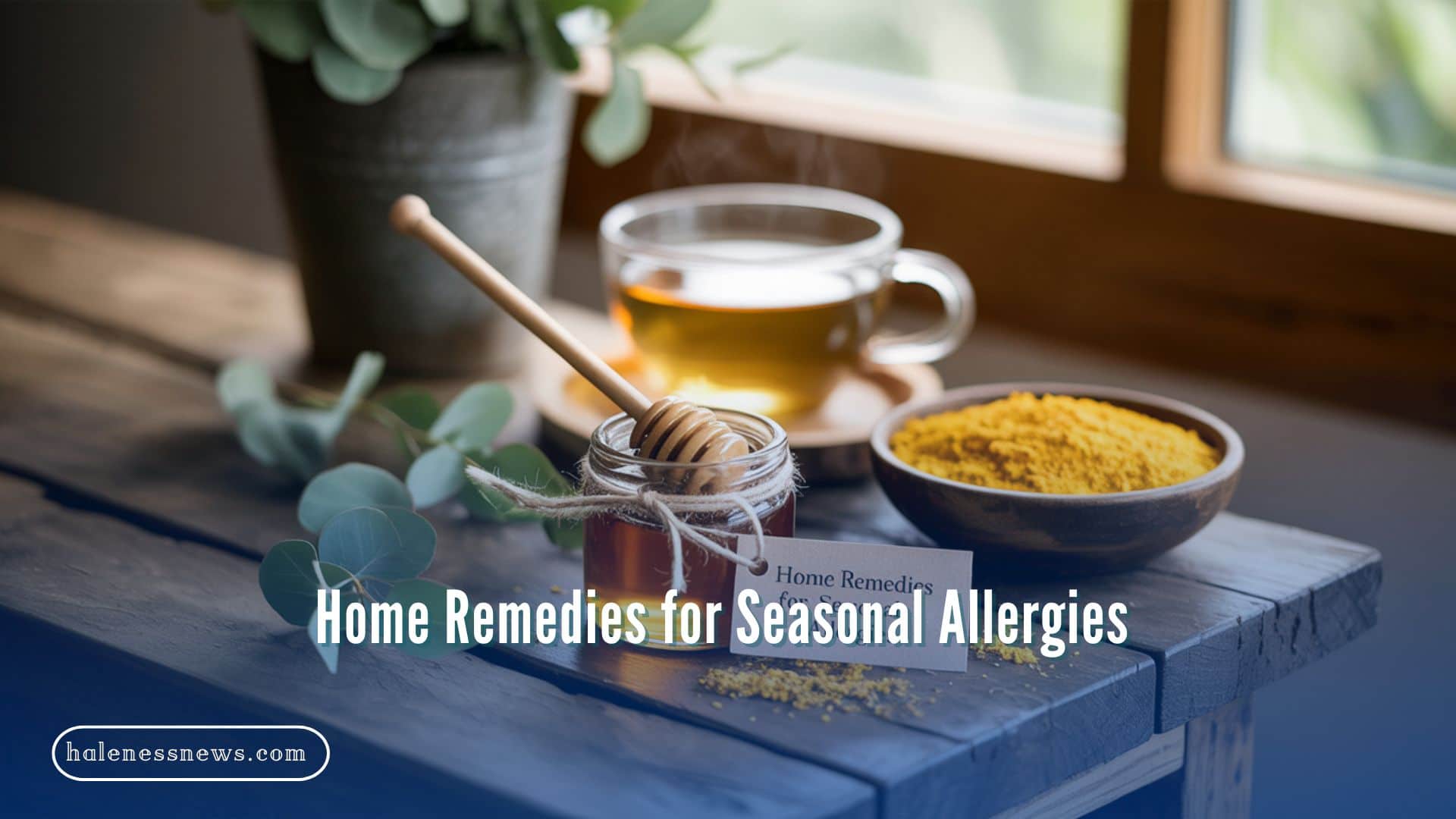Seasonal allergies, also known as hay fever or allergic rhinitis, affect millions of people every year. Whether it’s springtime tree pollen or fall ragweed, these allergies can turn a beautiful season into a sneezing, itchy, watery-eyed nightmare. Many people rely on over-the-counter medications, but a growing number are looking for natural remedies for allergy symptoms.
If you’re tired of constant medications or are simply seeking a gentler approach, this guide will walk you through some of the most effective home remedies for seasonal allergies. These remedies are easy to incorporate into your daily life, often using ingredients already in your home.
Understanding Seasonal Allergies:
Before diving into remedies, it helps to understand what causes seasonal allergies. When your body encounters allergens like pollen, it mistakes them for harmful invaders. This triggers your immune system to release histamines, which are responsible for classic allergy symptoms: sneezing, congestion, itchy eyes, and more.
Common seasonal allergens include:
- Tree pollen (spring)
- Grass pollen (summer)
- Ragweed pollen (fall)
- Mold spores (damp weather)
Natural Remedies for Seasonal Allergy Relief – Don’t Miss Out!
Here’s a breakdown of safe and effective home remedies that support your body’s response to allergens, minimize symptoms, and even help prevent reactions over time.
1. Local Honey
Many believe that eating local raw honey can help your body gradually get used to pollen in your area, acting like a form of natural immunotherapy.
- How to use: Take 1 teaspoon of raw, local honey daily.
- When to start: Ideally 1–2 months before allergy season starts.
- Why it works: Trace amounts of local pollen may help desensitize your immune system.
2. Saline Nasal Rinse (Neti Pot)
A saline rinse or nasal irrigation is one of the fastest ways to clear allergens from your sinuses. It also reduces inflammation and eases nasal congestion.
- Recipe: Mix 1 cup of distilled warm water with ¼ teaspoon salt and ¼ teaspoon baking soda.
- How to use: Pour the solution into a neti pot or squeeze bottle, tilt your head, and flush one nostril at a time.
Note: Always use distilled or previously boiled water to avoid infections.
3. Steam Inhalation
Steam therapy helps loosen mucus and relieves pressure in your sinuses. It also opens up your nasal passages, offering temporary but immediate relief.
- How to use: Inhale steam over a bowl of hot water. Add a few drops of eucalyptus oil or peppermint oil for added relief.
- Time needed: 10–15 minutes, once or twice a day.
4. Apple Cider Vinegar
Apple cider vinegar (ACV) is a popular natural remedy for allergies because it helps thin mucus and supports your immune system.
- Recipe: Mix 1 tablespoon ACV with a cup of warm water and a teaspoon of raw honey.
- Dosage: Drink up to 2 times per day during allergy season.
5. Quercetin-Rich Foods
Quercetin is a plant pigment (flavonoid) found in many fruits and vegetables. It’s a natural antihistamine that can block allergic reactions.
- Foods high in quercetin:
- Apples
- Onions
- Berries
- Kale
- Broccoli
You can also take it as a dietary supplement, but consult your doctor if you have any medical conditions.
Summary of Home Remedies for Seasonal Allergies:
| Remedy | Main Benefit | How to Use | Notes |
|---|---|---|---|
| Local Honey | Builds resistance to local pollen | 1 tsp daily | Start before allergy season |
| Saline Rinse (Neti Pot) | Clears allergens from nasal passages | Flush 1–2 times/day | Use distilled water only |
| Steam Inhalation | Opens sinuses, reduces congestion | 10–15 min sessions, add oils | Helps with immediate relief |
| Apple Cider Vinegar | Thins mucus, boosts immunity | Mix with water + honey | 1–2 times/day |
| Quercetin Foods | Natural antihistamine | Include in daily diet | Can supplement if needed |
Herbal and Supplement-Based Allergy Relief – Don’t Miss Out!
Butterbur Extract:
Butterbur is an herb with strong antihistamine effects. Some studies show it works as well as over-the-counter meds like cetirizine (Zyrtec), without causing drowsiness.
- Dosage: 50 mg twice daily (only PA-free butterbur).
- Caution: Always choose purified versions to avoid liver toxins.
Stinging Nettle:
Another natural antihistamine, stinging nettle has been used for centuries for pollen allergies and respiratory health.
- How to take: Capsules, tinctures, or as tea.
- When to start: Begin early in allergy season or even beforehand.
Probiotics:
A healthy gut is essential for a balanced immune system. Probiotics can reduce the severity of allergic reactions by improving gut microbiota.
- Sources: Yogurt, kefir, kimchi, sauerkraut, or a daily probiotic supplement.
Lifestyle Adjustments for Allergy Prevention:
Sometimes, it’s not just about what you take—but also how you live. Minor changes in your environment can drastically reduce your exposure to allergens.
Keep Windows Closed
Especially on high pollen days, keeping your windows shut reduces the entry of allergens into your home.
Shower and Change After Going Outside
Pollen clings to your hair, skin, and clothing. Rinse off and change when you get home to minimize spread.
Use a HEPA Air Filter
Install HEPA filters in your bedroom and change your HVAC filters regularly. These filters trap airborne allergens like dust and pollen.
Vacuum with a HEPA Filter
Standard vacuums can blow allergens around. HEPA vacuums trap them instead.
Dry Laundry Indoors
Hanging clothes outside might feel fresh, but they can collect pollen and mold spores.
Supporting Your Immune System Naturally:
Your body’s immune system plays a central role in how you respond to allergens. By boosting it naturally, you can reduce sensitivity and inflammation.
💪 Eat an Anti-Inflammatory Diet
Include:
- Omega-3-rich foods (salmon, walnuts, flaxseed)
- Leafy greens and colorful veggies
- Fermented foods for gut health
🌞 Get Enough Vitamin D
Low vitamin D levels have been linked to increased allergy symptoms. Consider safe sun exposure or supplements if needed.
💤 Prioritize Sleep and Hydration
Allergy symptoms get worse when you’re tired or dehydrated. Water thins mucus, and rest allows your immune system to reset.
What to Avoid During Allergy Season?
- Scented candles and air fresheners: These can irritate your sinuses.
- Smoking and secondhand smoke: Major triggers for respiratory irritation.
- Outdoor activity during peak pollen hours: Usually early morning and late afternoon.
When to See a Doctor?
While home remedies are helpful, they may not replace medical treatment for severe allergies. See an allergist if:
- Symptoms disrupt daily life
- You have asthma or difficulty breathing
- You’re considering allergy shots or prescription meds
FAQs:
1. Should I stay away from some foods during allergy season?
Yes. Some fruits and veggies, like apples, carrots, or celery, can make allergy symptoms worse for some people because they are similar to pollen. Also, dairy products like milk and cheese may make you feel more stuffed up by increasing mucus.
2. Can drinking tea help with allergies?
Yes. Herbal teas like peppermint, nettle, or chamomile can help clear your nose, calm your body, and reduce swelling. Plus, drinking warm tea helps keep your throat and nose moist, which is good when you’re feeling stuffy.
3. When should I start using natural remedies before allergy season?
Try starting about 1 month before allergy season begins. This gives your body time to get used to things like local honey or vitamins that may help lessen allergy symptoms when pollen levels go up.
4. Can what I do at night affect my allergies?
Yes. Before bed, take a shower to wash off pollen from your skin and hair. Use clean sheets and pillowcases, and try not to wear clothes you wore outside into bed. These steps can help you sleep better without allergy problems.
5. Does stress make allergies worse?
Yes, being stressed can make allergy symptoms feel stronger. To feel better, try relaxing activities like deep breathing, walking, or stretching. Feeling calm helps your body handle allergies more easily.
Final Thoughts:
Managing seasonal allergies doesn’t always require pharmaceutical solutions. With a combination of natural remedies, dietary adjustments, and smart lifestyle habits, you can take control of your symptoms and enjoy the changing seasons again.
Whether you try local honey, steam therapy, or even butterbur supplements, be consistent—and give your body time to adjust. As always, speak with a healthcare provider before starting any new herbal supplements, especially if you’re on medication or pregnant.
Latest Post:





